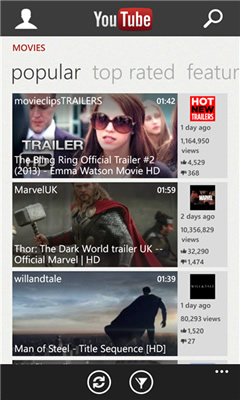Google yesterday issued a cease-and-desist letter to Microsoft, demanding Redmond pull its YouTube app from the Windows Phone Store. The app has been available for over a week; however, it violates YouTube's API usage terms. Google says Microsoft has until May 22 to withdraw or change the app before deeper consequences are triggered – possibly even legal recourse.
Microsoft's primary offense is the app's ability to strip advertisements from YouTube videos – an entirely deliberate feature, according to reports. Additionally, the WP8-based app provides users with ability to download videos to their devices – another mark against Microsoft in its use of YouTube's API.
When ZDNet asked Microsoft if something had changed policy-wise, allowing them to release such a YouTube app, the company stated, "Windows Phone invested additional engineering resources against existing APIs to re-architect a Windows Phone app that delivers a great YouTube experience, including support for unique Windows Phone 8 features such Live Tiles and Kids Corner. Microsoft did not receive any additional technical support to create the Windows Phone YouTube app."
Shortly after Google issued its notice, Microsoft responded that it would be "happy to include advertising", but claims it needs Google to provide the "necessary" APIs. An "API" is a set of high-level instructions commonly used in software and web-based services, allowing developers to utilize features in a simplified way.
At the time of this writing, the app is still available for download and there have been no outward signs of Microsoft hustling to remove it.
Microsoft's official response is as follows:
"YouTube is consistently one of the top apps downloaded by smartphone users on all platforms, but Google has refused to work with us to develop an app on par with other platforms. Since we updated the YouTube app to ensure our mutual customers a similar YouTube experience, ratings and feedback have been overwhelmingly positive. We'd be more than happy to include advertising but need Google to provide us access to the necessary APIs. In light of Larry Page's comments today calling for more interoperability and less negativity, we look forward to solving this matter together for our mutual customers."
The "necessary APIs" part is a bit misleading. The APIs Microsoft appears to be interested in are for metadata only; these bits and pieces of information about each video aren't really necessary for displaying ads. Rather, the difficulty for Microsoft is its desire to craft more than just a WP8 app which essentially opens to YouTube's website; the software-maker wants to build an app that follows WP8's tile-based design and sports its own look and feel. To do this though, Microsoft needs access to YouTube's video metadata – data which Google doesn't seem eager to part with.
